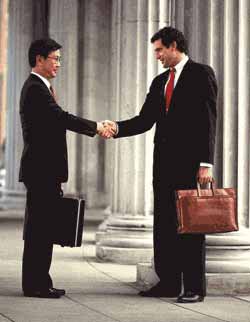Numismatist
Numismatists are people who collect coins as a trade or hobby. Though they are usually stereotyped as big muscular alpha males who are most easily recognized as coin collectors, that is not always the case.
The Collector[edit | edit source]
A coin collector has to have street smarts. These street smarts include carrying a guide book disguised as a book on mathematical relativity, calculus of black holes, or any other easy read one may have at home. When buying coins, looking in this camouflaged book can help you determine the fair price for a coin and gives you the chance to do the shank motion when the seller gives an outrageous price. Poker faces are also very important. Never under any circumstances does a good collector show his interest in the coin he is looking at. In fact, some of the n00bie collectors sport a thick mustache and beard along with dark aviators to conceal all emotions. A seller, if he is an asshole, which they usually are, will try to sell a coin for more than he normally would, if he sees that the interested party is desperate to have the coin. Two other very important tools of the great coin collecting are the magnifying glass and good research. When buying a coin a magnifying glass is crucial. Instead of using it to burn black dots into benches, numismatists use it to carefully inspect the surfaces of the coins for scratches, dents, nicks, mold, spilled dairy products, feces, and nuclear waste. Though collectors sport a coin book as mentioned previously, they also actually research the past market for the specific coin. Finally, everyone loves cash money. Cash can incline the thieving bastards that are sellers to give you a discount so that they can have the green and not report it in their yearly income. In that sense, coin sellers are just like drug dealers.
The coin and the market prices it commands[edit | edit source]
Coins are like women, they either make you happy or make you go broke. Coins can make you happy when they are being sold at a time where market conditions make them as cheap as possible. This means that if the coin is made out of metals such as gold or silver, they should be purchased at a time when silver and gold are cheap. This makes sure you buy the coin for its true value and not its metal value. Then, a coin can break you. Believe it or not, coins - just like high fashion - have trends. While some anorexic teens go out to buy the latest fashion in order to be the world's best conformist, numismatists go out and buy up the coins that have been "rediscovered" by some guy who should keep his day job. Thus, for a while, the prices for those rediscovered coins will skyrocket. If a numismatist buys a coin during this bull market, he usually sells it quickly to make a profit. However, for those novices that buy the coin at this time and keep it lose a ton of money as the market for that coin drops over time due to loss of interest or a market that exceeds any possible high value for the coin.
The value of a coin based on its condition[edit | edit source]
When buying a used car, nobody specifically looks for the one that has the most damage, or in the case of the Ford Pinto, the most likely to blow up. Obviously, the better the condition the coin the higher value it commands. Many people have published books on how to tell the condition of all coins. Should you buy those books? Well, if you are the type of idiot that buys the "How To Get Rich Quick" books that the various millionaires with the even more various accents publish, then yes. For the population that has more than a pebble and two screws in their head, then no. Every coin's condition is determined by its own standards. This is because coins have very different designs that wear out differently and because for coins that aren't as rare as others, any damage severely lowers it condition rating. In terms of American coins, the perfect book that correctly tells how to distinguish the condition of American coins by going over every coin is THE RED BOOK. For international coins the task is much harder because there is no single book that covers all international coins.
Cleaning coins[edit | edit source]
Don't even think about it. Every time a numismatist goes to clean his or her coin, a cow somewhere in the world gets Mad Cow Disease. Would you sandpaper your mother in law's face? Bad example. Would you sandpaper your own face? Obviously not unless you are really ugly. Coins however are never ugly and can only depreciate in value from a nice scrubbing. Also, almost anything that rubs against a coin's surface will scratch it in some way (even fingers). If you are one of those people that read the previous paragraph and bought a book that tells how to judge universally the condition of coins and just have to clean a newly purchased coin, it is very important that the job is done by professionals such as numismatic shop owners.


